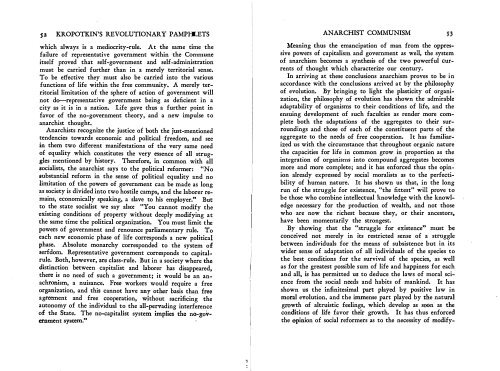Kropotkin's Revolutionary Pamphlets - Libcom
Kropotkin's Revolutionary Pamphlets - Libcom
Kropotkin's Revolutionary Pamphlets - Libcom
You also want an ePaper? Increase the reach of your titles
YUMPU automatically turns print PDFs into web optimized ePapers that Google loves.
sz<br />
KROPOTKIN'S REVOLUTIONARY PAMPHLETS<br />
ANARCHIST COMMUNISM<br />
which always is a mediocrity-rule. At the same time the<br />
failure of representative government within the Commune<br />
itself proved that self-government and self-administration<br />
must be carried further than in a merely territorial sense.<br />
To be effective they must also be carried into the various<br />
functions of life within the free community. A merely territorial<br />
limitation of the sphere of action of government will<br />
not do--representacive government being as deficient in a<br />
city as it is in a nation. Life gave thus a further point in<br />
favor of the no-government theory, and a new impulse to<br />
anarchist thought.<br />
Anarchists recognize the justice of both the just-mentioned<br />
tendencies towards economic and political freedom, and see<br />
in them two different manifestations of the very same need<br />
of equality which constitutes the very essence of all struggles<br />
mentioned by history.<br />
Therefore, in common with all<br />
socialists, the anarchist says to the political reformer: "No<br />
substantial reform in the sense of political equality and no<br />
limitation of the powers of government can be made as long<br />
as society is divided into two hostile camps, and the laborer remains,<br />
economically speaking, a slave to his employer." But<br />
to the state socialist we say also: "You cannot modify the<br />
existing conditions of property without deeply modifying at<br />
the same time the political organization. You must limit the<br />
powers of government and renounce parliamentary rule. To<br />
each new economic phase of life corresponds a new political<br />
phase. Absolute monarchy corresponded to the system of<br />
serfdom. Representative government corresponds to capital.<br />
rule. Both, however, are class-rule. But in a society where the<br />
distinction between capitalist and laborer has disappeared,<br />
there is no need of such a government; it would be an anachronism,<br />
a nuisance. Free workers would require a free<br />
organization, and this cannot have any other basis than free<br />
agreement and free cooperation, without sacrificing the<br />
autonomy of the individual to the all-pervading interference<br />
of the State. The no-capitalist system implies the no-government<br />
system. "<br />
Meaning thus the emancipation of man from the oppressive<br />
powers of capitalism and government as well, the system<br />
of anarchism becomes a synthesis of the two powerful Currents<br />
of thought which characterize our century.<br />
In arriving at these conclusions anarchism proves to be in<br />
accordance with the conclusions arrived at by the philosophy<br />
of evolution. By bringing to light the plasticity of organization,<br />
the philosophy of evolution has shown the admirable<br />
adaptability of organisms to their conditions of life, and the<br />
ensuing development of such faculties as render more complete<br />
both the adaptations of the aggregates to their surroundings<br />
and those of each of the constituent parts of the<br />
aggregate to the needs of free cooperation. It has familiarized<br />
us with the circumstance that throughout organic nature<br />
the capacities for life in common grow in proportion as the<br />
integration of organisms into compound aggregates becomes<br />
more and more complete; and it has enforced thus the opinion<br />
already expressed by social moralists as to the perfectibility<br />
of human nature. It has shown us that, in the long<br />
run of the struggle for existence, "the fittest" will prove to<br />
be those who combine intellectual knowledge with the knowledge<br />
necessary for the production of wealth, and not those<br />
who are now the richest because they, or their ancestors.<br />
have been momentarily the strongest.<br />
By showing that the "struggle for existence" must be<br />
conceived not merely in its restricted sense of a struggle<br />
between individuals for the means of subsistence but in its<br />
wider sense of adaptation of all individuals of the species to<br />
the best conditions for the survival of the species. as well<br />
as for the greatest possible sum of life and happiness for each<br />
and all, is has permitted us to deduce the laws of moral science<br />
from the social needs and habits of mankind. It has<br />
shown us the infinitesimal part played by positive law in<br />
moral evolution, and the immense part played by the natural<br />
growth of altruistic feelings, which develop as soon as the<br />
conditions of life favor their growth. It has thus enforced<br />
the opinion of social reformers as to the necessity of modify-

















